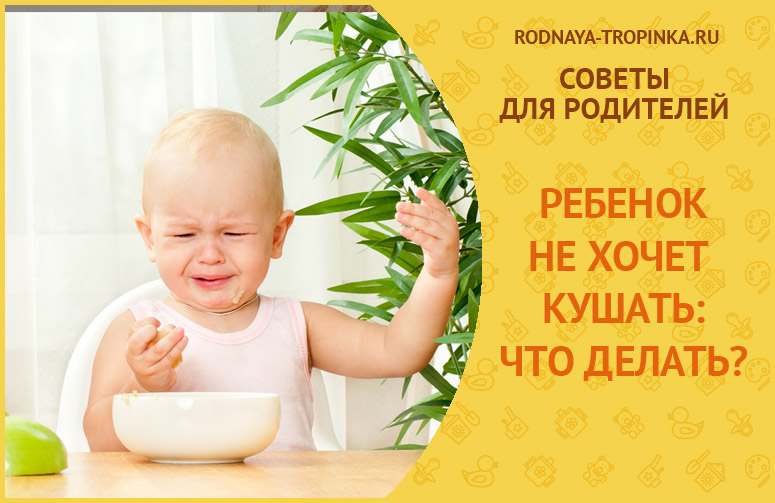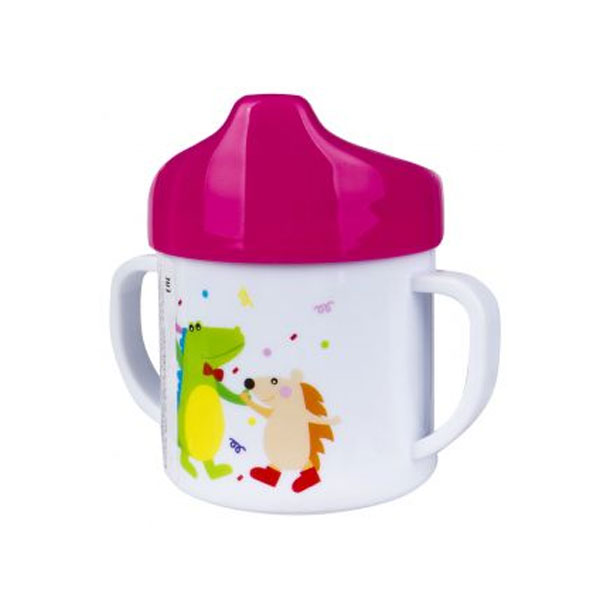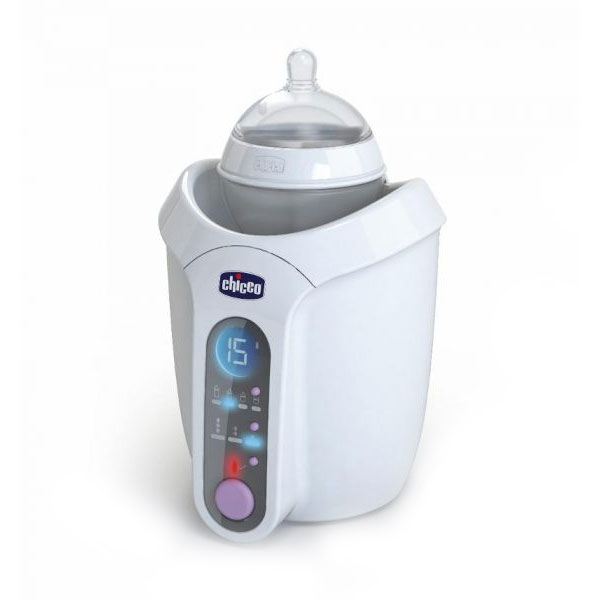

The child does not want to eat: what to do
I invited Maria Gellert, a reader of Native Path, whom we met on my course, to write this article. In the forums of the course, we discuss not only the development of speech and thinking of the child, but also many other issues related to the development of the baby in early childhood. One of these problems is the lack of appetite in a child. Maria has been advising the mothers of our course on child nutrition for several years, so I asked her to write an article for all readers of the site.
Maria faced the problem of her daughter refusing to eat, began to look for ways out of the situation, solved this problem, later completed courses for baby food consultants and now actively helps other mothers and children cope with similar situations and problems. I give the floor to Mary.
The child does not want to eat: medical and psychological reasons for a child's refusal to eat, ways to help a small child, advice to parents, useful links.

"My child doesn't want to eat." This is the name of the book by the Spanish pediatrician Carlos Gonzalez, which I recommend for mandatory reading for all parents of children with small children. It is read in one breath. When I read it, I roared almost “the whole book”, because I myself had the experience of absolutely complete refusal of food by my daughter. Now my job is to help moms and dads in similar situations.
Most of this book is about the fact that there is no point in putting pressure on a child in a situation of refusal to eat. Why? Let's look at the causes of reduced appetite in children.
Firstly, the lack of appetite in a child may be a purely subjective opinion of the parents. For example, if your one year old baby during the day with pleasure (!) eats 100 gr. porridge, a couple of crackers, a slice of banana and a few tablespoons of cottage cheese, most likely you just have too high requirements for the appetite of children. And even if you yourself or in your immediate environment have children who at the same age gobbled up everything on both cheeks without stopping, you must remember that we are all different, and this particular child has every right not to have such an appetite.
Secondly, reduced or absent appetite may be a symptom of some hidden disease. I myself, not being a doctor, at this point in time can only say for certain about the five most common medical causes of impaired appetite in children. Naturally, there can be many more of them, so I recommend initially finding very good pediatricians and gastroenterologists.
Thirdly, the refusal of a small child to eat or reduced appetite can be a manifestation of psychological problems. We will talk about this below in the article.
HELPFUL ADVICE:
It is advisable to find "your" doctor who will respect breastfeeding and your problem. In NO EVENT should he give recommendations such as “immediately wean”, “force-feed”, “persuade”, “do not give food to increase hunger”, “ignore it, everything will pass by itself, you have a healthy baby” and etc. Find a doctor who will actually look for a medical reason.
Let's take a closer look at these reasons and what we should do in each case.
There are five main and most common medical causes of loss of appetite in children.
Food allergies and intolerances may not appear outwardly, pass quite secretly, but damage the child's body and lead to the fact that the child does not want to eat. These can be attributed intolerance to gluten and casein. They are not visible externally, but these problems lead to the destruction of the intestinal wall, these causes affect both the appetite and the behavior of the child (the child has tearfulness, irritability, etc.). This is very common in children with autism.
At the same time, even the most harmless allergies, manifested by a slight rash in some children, can cause an almost complete lack of desire to eat (I remind you that this is how the child’s body reacts). Therefore, consultation with an allergist in case of problems with the child's refusal to eat may also be necessary.
THIS IS IMPORTANT TO KNOW:
analysis for the presence of gliadin (a particle of gluten) can give a false negative answer, that is, there is intolerance, and gliadin is found in normal amounts. With age, the percentage of false-negative readings decreases. Therefore, the most reliable will be analyzes taken no earlier than the sixth year of a child's life. But also in more early age if you have a good specialist, it makes sense to undergo this examination.
We all know that when a child is sick, he practically does not eat. In frequently ill children, a decrease in appetite may also be present during remissions. Yes, and problems with immunity as well as with allergies (in fact, allergies are a decrease in "food immunity") can be latent - without fever, runny nose and cough.
In the case of anemia, the fact that the process is hidden can also be observed, i.e. hemoglobin levels may be normal, but there is anemia. Therefore, doctors recommend taking an analysis for iron (ferritin).
These are problems associated with various clamps - muscle, bone, nerve, vascular, or a combination of them. As an example, instability of the cervical spine can lead to poor blood supply to the brain (clamped blood vessels) and / or poor regulation of internal organs, including the intestines (clamped nerve fibers). Both of these lead to a decrease in appetite.
Therefore, if you have an osteopath in your city, it is highly advisable to contact such a specialist, especially in cases of rapid or complicated childbirth, child falls at an early age, signs of violations of a similar nature, information about which can be found in specialized literature or on medical sites on the Internet.
In cases of complicated pregnancies (and possibly even during their normal course), there are situations when the child's gallbladder could not form on time or was formed incorrectly, which leads to indigestion, and therefore to a violation of appetite. Therefore, it is desirable to do an ultrasound of the gallbladder.
Ultrasound must be done on an empty stomach - within 12 hours the child should neither eat nor drink (including breast milk), this is due to the fact that if at least a couple of ml of liquid enters this period of time, the gallbladder may shrink and it will be displayed on the screen just not visible. You can't even brush your teeth! For parents of small children, this examination is very difficult psychologically (and for the children themselves too). But if there is a constant problem of the child's refusal to eat, this must be done. By starting drug therapy, we will be able to help the child in time - not only the appetite will improve, but also the assimilation of food, which is very important. So be patient.
THIS IS IMPORTANT TO KNOW:
In all these situations, a decrease in appetite is a protective mechanism of the body, because. in the following situations, excess food, or it may simply not be digested and pass through the “transit”, while causing harm to the body with its decomposition at a sufficiently high internal body temperature. Or harm with your allergic reaction (in the case of allergies and celiac disease).
In addition, children with these disorders later than their peers show food interest(see below about it), which may include the following unfavorable chain:
There may well be situations where several problems are combined at the same time. They can both stem from each other (for example, instability of the SHOP can lead to anemia, or bending of the gallbladder will lead to impaired immunity), or not depend on each other. Therefore, it is desirable to confirm or exclude all options.
A child's refusal to eat may be the result of an eating disorder or other neuropsychological problems.
To begin with, why is it necessary with the prefix "neuro". The fact is that the process of digestion occurs not only in the gastrointestinal tract, but is also associated with the functioning of the brain of the child. That is, the entire work of digestion is regulated by the brain and the hormonal system (by the way, also regulated by the brain). When we eat with appetite, the whole body is tuned to digest food - it secretes saliva, gastric and pancreatic juices, bile, the stomach and intestines begin to contract, blood rushes to them, etc. Remember Pavlov's dog: the bell rings, she knows that food will be brought now and she secretes saliva and gastric juice. The same thing happens with a person.
Food should bring pleasure, we should anticipate it and eat only in a state of presence of appetite. As mentioned above, food without appetite will not only pass through “transit”, without benefiting, but will also begin to destroy the body.
So, what can happen in the brain of a child that the body refuses to eat? The most common reason for this is a lack of nutritional interest. Food interest is an interest specifically in food, and not in anything else, in which all the physiological processes described above are manifested. Nutritional interest may be absent for various reasons.
The most common reason is when all family members eat in the absence of a child, for example, when he sleeps or walks with his grandmother. The baby himself is fed separately from everyone, most often even on a separate chair.
WHY IS IT IMPORTANT:
Normally (from the point of view of evolution) all cubs, including human ones, should see what their parents or other close adults eat. This is necessary in order to protect the child from eating dangerous and harmful foods.
What happens when a baby is fed separately? He does not see the process of feeding his family, and therefore, food interest cannot manifest itself. Ordinary research - maybe, but food - no.
In such situations, children begin to eat the first complementary foods, seemingly with pleasure, but only because of the presence of ordinary curiosity. This food is poorly digested (there is no food interest), and therefore, rather quickly, the body begins to refuse to take in what is badly reflected on it. And the child does not want to eat.
WHAT TO DO: THE RIGHT OPTION
Initially, from 4-5 months (if complementary foods start at 6), take the child with you to the table when you eat yourself, preferably with dads, grandparents, uncles and aunts and, of course, with older children. This is accepted in the traditions of all cultures, perhaps, except for the modern industrial one.
If the child is now older and already has problems - start now, it's never too late.
At the same time, eat the food that the child should eat. For example, in the morning you can make yourself porridge, for lunch - a vegetable casserole with boiled chicken, and for dinner, cook soup-puree. Everyone will benefit from this. Although it will not be easy for many to give up mayonnaise, dumplings and smoked sausage. But remember that you are doing this not only for yourself, but also for the child. Eat with pleasure! Go with your child to visit and cafe, cook together.
A good solution to the problem would be a significant reduction in portions. Since the process of eating is labor for small children, it is quite convenient to draw an analogy here with the process of work in adults.
A LITTLE EXPERIMENT: LET'S IMAGINE TOGETHER
Imagine how reluctantly you get to work when you know that you will have to do it for several hours, or even a whole day without a break? And if it is not paid (for children - these are cartoons, promises to take a walk, etc.)? Then we will shirk such activities in all possible ways, even the activity itself can potentially bring us at least some pleasure.
And now let's imagine a different situation: we are interested in the scope of our work and we have to work on it for literally 20-30 minutes. Not for long, and the desire and strength to start it in such a situation increases significantly! And further in the process, we may not want to stop.
What definitely cannot be done in communication with a child - a small child - is to force-feed and exert psychological pressure.
Psychological pressure includes: persuasion; promises to do something in return for the fact that the baby will eat; threats; shame; comparing your baby with children with a good appetite, etc.
All this is child abuse. And it can lead to a loss of basic trust in parents and in the world at large. In addition, not only will it not improve digestion, but it can completely stop it under the influence of stress hormones.
“As soon as a struggle flares up between mother and child for the right to manage the feeding process, we can immediately say that victory will be on the side of the baby :). If parents put too much emotional pressure on him and force him to sit over a plate for hours, for example, or send the child to his room as punishment for refusing food, then this threatens to break emotional bonds and attachment relationships. He may even start eating, because losing attachment is even more stressful than force-feeding. However, this situation will put a significant strain on the emotional bonds between mother and child.” (Karl Brisch. From the book: Attachment Theory and Raising Happy People).
I think that among those reading this article, there will definitely be mothers (or fathers, or specialists) wondering - can not the lack of appetite be provoked by breastfeeding? Is it possible for a child to simply gorge on mother's milk?
No, it cannot - it is not physiological and not logical from the point of view of evolution. Quite the contrary: "hanging on the chest" is a consequence, not a cause.
Breast milk is the safest and most easily digestible food for a baby, so when it is impossible to eat adult food (for whatever reason), babies compensate for the lack of nutrients through milk. And by weaning the baby, you “treat the symptom, not the disease.” Yes, it is possible that the child will start to eat better, but this does not mean that he will get more benefit from it. In addition, there are children for whom weaning is so traumatic that they not only do not begin to eat more, but carry this negative experience through their lives without even realizing it. This is one of the variants of perinatal attachment trauma. Therefore, it is worth continuing to breastfeed the child for as long as he requires, while simultaneously addressing the issues of “reason”.
In general, I recommend simultaneously solving the issues of the child's health and the presence of psychological problems associated with nutrition.
I asked Maria to share her story of overcoming a child's refusal to eat. This real story without embellishment: it has achievements, and mistakes, and their consequences, and specific advice on how to help the child and cope with the consequences of his mistakes. Each family has its own experience, its own situation, but how important it is for everyone who has this problem to find out the experience of those who have already gone through this problem and helped their child. How important it is to understand that you are not alone, that there are those families who understand you and can share their experience. How important it is to see mistakes in order to avoid them. And I am grateful to Maria that she shared her experience - the experience of the past, the mistakes made and the conclusions from them, which will help other families solve the problem and, even better, prevent it.
Our story began with the fact that during the commission of the first month in the clinic, they began to intimidate me with “protracted” jaundice, hospital, droppers, etc. and recommended to supplement the daughter with water in large volumes. However, these recommendations were given to us even before the blood tests were done. Our girl almost immediately stopped gaining weight. Against almost 2 kg acquired in the first month of life, she began to add 200-300 grams. per month. The pediatricians said that everything was fine (with the argument that she gained well in the first month), and we believed in it.
These were our first two mistakes (additional soldering and inactivity). By 6 months, the daughter weighed only five and a half kg. Then it started on the knurled.
At six months, we started introducing complementary foods. At the same time, I did not at all think about the fact that the child does not wake up one day with a desire to eat something other than mother's milk. They did everything according to the “classic scheme” - they themselves ate while she was sleeping or played nearby on the floor, and they fed her (or rather tried to feed) separately, at her high chair, industrial food (jars and cereals for children). And of course, she tried the first portions, and then she inevitably began to refuse food.
What we just did not do, but at the same time did not do anything right! They persuaded her, “fed” her to cartoons, tried to entertain her and shove a spoon into her mouth while she was distracted, on the advice of my friend, I gave her a breast, and then quickly took it away and immediately shoved food into her mouth. It was SHOVED, because there is no other way to call it. Every month it got worse and worse, there were periods when she had no monthly weight gain at all.
When my daughter was 11 months old, in the clinic they began to scare me that if in a month we did not gain at least half a kilo, “the child would be admitted to the hospital and fed through a tube or intravenously. Don’t eat like that – force feed!!!” Nerves on edge, fear for the child, guilt, hopelessness. And by the age of one, we began to force-feed our girl. When my husband was at home, he kept her, and I “fed”. When we were alone with her, I held her head with one of my hands, and with the other I SHOVED food into the child. FORGIVE ME, DAUGHTER! We both sobbed several times every day. In fact, it was a period of hell. And my little bird, which had already begun to speak the simplest words, fell silent. Shut up for six months. She even stopped babbling! In her eyes, we became both parents and executioners at the same time. This went on for several months.
Naturally, people in our information age are beginning to look for answers to their questions on the Internet. So I, by some miracle, through people completely unfamiliar to me, found the ProHV website and the course “Natural complementary foods. Fundamentals and Counseling” (ProGV website). I started studying there exclusively for myself. I learned about the book by Carlos Gonzalez "My child does not want to eat." I read it in one evening in one breath, taking breaks only to cry. The lines from the book so changed my attitude not only to the process of feeding children, but also to education, I would even say to raising children in general. I wanted to share my knowledge with other mothers. This course and this book were turning points not only for our daughter, but also for me personally.
And so we stopped forcing her to eat, we just put her at the table with us and showed how we eat. I want to say right away that it was not only not easy - it was terribly hard. After all, she still weighed only 7 kg (this is more than a year!), And accordingly, we still worried about her health and periodically broke down in an attempt to persuade her to eat something. She was still terribly afraid of one kind of spoon (even an empty one) and was still afraid to go into the kitchen. There were periods when she did not eat anything but my milk for a whole week. Then I tried a little food and again did not eat anything for several days. We both had to bite our lip and patiently wait for her to move away from everything that was and want to eat something other than breast milk.
It was about a month and a half after she melted and stopped panicking at the sight of food. After another month or two, she began to slowly eat on her own. Let not in the volumes in which we would like, but ITSELF. It was very important! And we also heard from her “mom”, “dad”, “give” and other simple words that she had not uttered for so long.
She hung on my chest for days. Thank God I did not succumb to the influence of the people around me, at least in this. But the only ones who supported me to keep breastfeeding were only my husband and sister.
Then we learned about osteopathy, and that problems in this area can be associated with impaired appetite. And when my daughter was one year and five months old, we came to see such a specialist. The results were impressive: my daughter immediately stopped crying at night (there was such a problem) and the first thing we began to hear from her in the morning was the words “I want katya” (“I want porridge”).
And now the child’s appetite has long been established, but there is still no and no increase in height and weight, and even by the age of two and a half, her stomach began to hurt often. We underwent an examination and finally found the cause of all our suffering - congenital underdevelopment of the gallbladder. Because of this, food is poorly absorbed and as a result (it is also a symptom) a protective reaction of the body appears - poor appetite or its absence. With such a problem, only breast milk is well digested (and again, fortunately, we did not stop breastfeeding at that time!). The rest of the food is not only not digested, but is also a breeding ground for pathogenic microorganisms (which, again, breast milk fights). And in this regard, complementary foods had to be introduced not just according to the rules of natural complementary foods (using all methods to develop food interest), but more carefully.
If I could bring everything back, I would do everything completely differently. Listen to your children and don't repeat our mistakes!
In the article, we talked about the smallest children - little babies and their refusals to eat, about the reasons for those cases when a child at 1-2 years old does not want to eat. But this problem can also be in older children - at the age of 3, 4, 5, 6 years. What to do in these cases? A useful video by the famous doctor Komarovsky about small-sized children will help you understand not only the problem of food, but also ... yourself!
This video is not only a medical video of a doctor, but also a psychological one. It is not only about food and about children, but also about us - dads and mothers, grandparents and our life and our attitude to nutrition.
An article about children's nutrition is not in vain published on this resource, which is primarily devoted to the cognitive and speech development of the child. Having solved the problem of relationships with the child, establishing his nutrition, it is possible to get a significant positive shift in the overall development of the child. We have already seen from the story of a little girl how nutritional stress can lead to a temporary delay in speech development child and the disappearance of the baby's babbling and babbling first words. After all, a good appetite, full assimilation of food, is not so much a set of kilograms and physical development, it is good nutrition for the brain, and the emotional comfort of the child in communicating with his mother.
I wish your children to eat good health, a rich vocabulary, understandable and competent speech, and of course, a good appetite! 🙂
More interesting and useful information about children's nutrition can be found in the articles of the site:
This is important for every family to know about child development.
Toddlers by age.
Get NEW FREE AUDIO COURSE WITH GAME APP
"Speech development from 0 to 7 years: what is important to know and what to do. Cheat sheet for parents"
Click on or on the course cover below for free subscription

What to do if the child does not want to take the breast - the source of his joys, refuses it or sucks sluggishly? Why is this happening and how to fix it?
No one needs to be convinced breastfeeding, convenience and mutual pleasure for both the baby and his mother. But in the process of becoming lactation (the production of milk by the body of a nursing mother), problems may arise. One of the most unpleasant is that the child cries, does not take the breast, refusing it himself. The reasons why the baby repels the mother's breast can be described briefly - either the baby is unwell or his mother is unwell.
Content:
Voluntary refusal of the breast can be a symptom of an incipient disease of the baby. If at the same time the lack of appetite is accompanied by a rise in temperature (above 38 degrees), liquid stool, vomiting, uncharacteristic drowsiness for a baby, or severe anxiety, as well as a runny nose or cough - do not hesitate to consult a doctor.
Sometimes the baby can eagerly take the breast, and then stop sucking and start crying. This often happens in cases where the baby has a stuffy nose. Then he needs a consultation with an otolaryngologist. For example, with ear pain (at this age, because of a runny nose, the ears can start to hurt very quickly) or thrush (in case of infection with Candida fungi of the oral mucosa), the child’s refusal to breast is a completely logical phenomenon, since sucking the breast is difficult and uncomfortable. Then the baby cries, does not breastfeed, and loses weight because it is hungry and sick.
If you replace the breast with a bottle, this will not solve the problem in any way - the baby will still be painful and uncomfortable to suck. Plus, to one physiological stress of the baby (disease), another one will join (cessation breastfeeding), and this will only worsen the health of the baby.
The fact that the child does not want to take the breast may indicate the presence of damage to the central nervous system of the baby, which could occur in the womb, during birth, or in the first days after birth. In such cases, the child sucks sluggishly, takes the breast poorly, he is extremely restless, chin trembling (tremor), frequent regurgitation, and shuddering may be noted. It may seem that the baby is physically unpleasant to suck, for example, from a headache. Or the baby in the process of sucking the breast gets tired very quickly, then the baby throws the breast in exhaustion after 2-3 minutes.
In the event of the appearance of such symptoms or if the certificate from the maternity hospital contains an indication of PEP (perinatal encephalopathy), then you should contact the baby with a pediatric neurologist. At the same time, try to find the best option for breastfeeding: it may be better to feed the baby with your expressed milk from a cup or spoon for the first few weeks, you can try to do it from a syringe or pipette.
Most importantly, try to keep breastfeeding. But bottles are undesirable in this case, despite the fact that sucking from them will certainly be easier if the hole in the nipple is not too small. However, it is likely that later the child will not want to take the breast at all, and strain to "extract" milk. When the baby gets a little stronger (the nervous system and the brain of a little man are endowed with excellent abilities to recover), you can switch back to the usual way of eating - breastfeeding.
Trust your own baby and do not rush to deprive him of what he needs.
 A common cause of refusal of babies who are only a few days old is “pre-breast” sucking of the nipple or feeding the baby from a bottle in the maternity hospital. The baby does not understand why such changes are happening, it scares him, and the baby cries and does not take the breast.
A common cause of refusal of babies who are only a few days old is “pre-breast” sucking of the nipple or feeding the baby from a bottle in the maternity hospital. The baby does not understand why such changes are happening, it scares him, and the baby cries and does not take the breast.
Sometimes problems can arise due to improper attachment of the child to the breast or engorgement of the woman's mammary glands - the breast becomes tight, it is difficult to suck. If the baby does not breastfeed, the reason may be due to feeding on a schedule, not on demand, or for too short a time, in the opinion of the main consumer. It happens that the baby does not suckle at the breast if the mother does not have enough milk. As a result of such reasons, the child sucks sluggishly or may refuse altogether, he becomes restless and capricious.
When there is too much milk in the mother's breast, the newborn may choke out of habit, swallow excess air during feeding, then the baby often starts to have a stomach ache.
It happens that the child does not take one breast - which has the characteristics of the nipple or inflammatory changes in it.
Often a child does not want to breastfeed when there are changes in the taste of milk. Often this happens from 3 to 12 months after childbirth, when the mother's menstrual cycle is restored. At this time, breast milk acquires a slightly salty taste. It can also be explained by a violation of the mother's diet, when she eats excessively spicy and spicy foods.
Among other things, the reason that the child does not suckle the breast can be a change in the mother's smell, for example, due to a change in soap, perfume, deodorant.
Less often, a child does not take the breast well due to ongoing changes in the baby’s usual way of life, for example, such as the appearance of strangers in the house, mom’s going to work, a new nanny.
If the baby does not take the breast at the age of 6-8 months, in most cases we are talking about the imaginary refusal of the baby from the breast. Now the baby is actively crawling, learning the world in a contact way, but not watching him as before, and all these events can distract, captivate him. Even in a dream, he can continue to experience new emotions and often wake up at night.
 Whatever the cause of a baby not breastfeeding, sucking sluggishly or refusing at all, the main thing is to eliminate this cause! Try to carefully analyze the situation and help the baby and yourself begin to enjoy breastfeeding again.
Whatever the cause of a baby not breastfeeding, sucking sluggishly or refusing at all, the main thing is to eliminate this cause! Try to carefully analyze the situation and help the baby and yourself begin to enjoy breastfeeding again.
If there are problems, try to be near the baby at all times and offer the breast every time he wants to, at his request, including at night. Remove pacifiers and bottles. Of course, the baby is unlikely to approve such tough measures, but do not give up, do not despair, believe in your own strength and in the natural mind of the child. A few days - and everything will definitely work out.
Make sure your baby is in the correct position at the breast while breastfeeding. The baby must take the whole mouth areola, and not just one nipple of my mother's breast. The baby should be satisfied and calm during feeding, completely pressed against you, you can hear how the baby sucks and then swallows the milk - without retracting the cheeks and smacking sounds.
If there is not enough milk for the baby, try to eliminate any stressful situations, especially fears and worries about the lack of breast milk. Try to rest longer, sleep in the "sleep mode" of the baby (or take a nap at least once during the day). Any household chores, including street walks with a baby in a stroller, can be done by someone else, but the happiness of breastfeeding a baby is given only to you.
Try to maximize the number of feedings, give both breasts in one feeding: first one, and when he “empties” it, the other. Remember to ensure that your diet includes at least 2 liters of fluid per day. You can try folk and homeopathic lactogenic remedies. And be sure to support yourself psychologically, do not forget about yourself: it will take you only one hour to go to a beauty salon, to a store for a new thing that will please your eye, or to a cafe with a friend, drink a cup of green tea.
What to do if the child does not want to breastfeed because there is a lot of breast milk? Usually in the first days of the onset of lactation, approximately on the 3-4th day after childbirth, there is too much milk. In this case, it is desirable for mom to reduce the intake of fluids, especially warm, as well as food. The advice here is simple, but very effective! Your baby is still weak, the baby sucks sluggishly, so at first it is recommended to express the excess with a breast pump. This way you can prevent blockage of the mammary gland and breast engorgement. Try to take a warm shower before each feeding (then the breast will become softer, and the milk will be “given” easier) and tune in for success. Soon the baby will get stronger and grow up, and your body will debug the production of milk in the amount it needs.
There are certain breastfeeding rules that should be followed, namely:
Mommy may face some difficulties in the beginning. But you shouldn't give up. If you can't handle it on your own, ask a counselor for help with breastfeeding. Ask to teach you how to apply the baby correctly, even in the hospital, gain experience from other, more experienced mothers.
Do not worry and remember the most important principle of breastfeeding: in the case of a normal development of breast milk, your breast will produce exactly as much milk as your baby needs. Soon this will happen, and then no denials of the breast will threaten.
A little more about why the baby cries and does not take the breast, and how to deal with the baby's refusal to breastfeed:
In our difficult age of stress, women often experience problems with lactation, so many mothers cannot feed their baby only with breast milk, they have to start supplementing early. In such a situation, pediatricians recommend introducing an adapted dairy product into the diet. Why a child refuses a bottle with a formula and how to solve this problem, the employees of the Daughters-Sonny online store will tell.


Until 6-8 months, there is no alternative to artificial nutrition. Therefore, the refusal of the baby from the bottle puts parents in a very difficult situation, a way out of which must be found as soon as possible.
A newborn may not accept artificial food for several reasons: he is uncomfortable lying, he is not satisfied with the product itself, the infant does not like the nipple for feeding, or he simply does not want to eat. If increasing the intervals between feedings and changing the position of the baby's body do not help, then the reasons lie in the following:
A common reason for refusing a bottle of food, pediatricians say is the difficult transition from the usual nipple of the mother's breast to the nipple. If it has a straight standard shape and a wide opening, the baby may choke. It always causes crying and rejection of the new product. To get out of this situation, you need to change the nipple, and if the problem continues, then you need to change the mixture. pick up baby food followed by consultation with a pediatrician.
| Ways | Recommendations | Indications | Products |
|---|---|---|---|
| Changing the mixture | Adapted, hypoallergenic, palm oil free. | The composition is as close as possible to breast milk. Adapted products normalize digestion. | Nutrilak Premium, Similac Premium, Humana AR |
| bottle selection | With an orthodontic teat with a medium hole size (M). | An orthodontic nipple is shaped like a mother's nipple to a baby. It is convenient and easy to suck out liquid from it. | Nuk Classic, Bibi Little Stars |
| Replacing a bottle with a sippy | With two handles, sealed with a tight lid with a hard spout. | For children from six months. When moving from bottle to baby cups. | Canpol patterned training, Born Free |
| Buying a heater | Electric, with electronic display and automation. | You can heat the food to a comfortable temperature for the baby. The device remembers favorite modes. | Chicco, Dr. Brown's |
With the help of modern bottle warmers, parents bring food to the optimum temperature (36-37°C). After warming up to such indicators, the children agree to drink milk mixtures.
Parents whose children refused the usual artificial nutrition, switched to hypoallergenic formulations from Hipp, Similac, Humana and Nutrilon Premium. These products have a taste as close as possible to mother's milk, so the baby ate the entire portion with pleasure.
If the baby refused food through colic, then the prebiotics that are part of these infant formulas helped to eliminate intestinal spasms. In addition, hypoallergenic products normalize the intestinal microflora and improve appetite.
“For problems that arise when feeding is refused, the search for a solution should begin with changing the nipple or milk formula. If the food itself is in doubt, consult your pediatrician and buy another product. If after changing two types of food the child continues to act up, pick up a bottle with an orthodontic nipple or a drinking cup with a hard spout.
Specialist of the online store "Daughters-sons"
Antonova Ekaterina
The child stops eating when he does not like the offered milk formula at all or the shape and size of the nipple does not fit. Pediatricians recommend changing the type of food or bottle. You should also pay attention to the temperature of the prepared mixture. For heating, you can purchase a high-precision heater.
At the moment, many mothers, for various reasons, refuse to often breastfeed after 3-4 months, giving him pacifiers and feeding him too often with a normal supply of milk. Thus, not realizing that the baby can wean and when the mother nevertheless puts him to the breast, he can simply refuse. Although there are, in principle, a lot of reasons why a baby refuses to breastfeed.
 What are the reasons why a baby refuses to breastfeed?
What are the reasons why a baby refuses to breastfeed? Second place - force-feeding and improper care of the child.
Second place - force-feeding and improper care of the child.
Third place - Too early introduction of complementary foods.
This is serving the need for mother's milk, as the child is full and does not want to eat mother's milk. Therefore, you should control this process, and especially the amount of complementary foods.
Doctors strongly recommend breastfeeding if possible. Not only is it good for the baby, but it also establishes a special bond between mom and baby. Also, if you notice the reasons that can really be the main ones in the baby's refusal from the mother's breast, eliminate them immediately either with the help of a doctor (when there are visible health problems), or with the help of your mother's heart.
Mother's milk is the main source of nutrition for the baby. Sometimes a baby refuses to breastfeed for some reason. In this case, the mother begins to worry about the correct application, her own nutrition and other factors affecting feeding.
At times when the baby experiences discomfort during breastfeeding, it is very difficult to feed him, and this fact can adversely affect weight gain. Some babies eat only in a particular position or exclusively from one breast.
Women who have repeatedly gone through similar problems, it is much easier to understand this issue. It is very difficult for young inexperienced mothers to cope with breast rejection. Especially if there is a crowd of caring grandmothers and neighbors nearby, distributing advice on how to establish natural feeding. Annoying speeches about the futility of breast milk and the convenience of formula preparation suggest thoughts about stopping natural feeding. You can even stumble upon such an opinion that if the child does not take the breast, then there is no need to force it. Listening to such "smart" advice is strictly prohibited.
When faced with rejection for the first time, it is best to seek help from a lactation specialist, pediatrician, or psychologist. They will help you understand the reasons why the baby abandons the breast, and give recommendations on how to proceed.
Most often, mothers look for the cause in the wrong diet, the quality of milk, their poor health or mood. In fact, the reasons why the child is naughty are much more significant.

The main reasons may be:
If the child refuses the breast due to pain, then you need to try to alleviate his condition. The nose is blocked - clean and drip the medicine, the ears or tummy hurt - give a painkiller, the temperature has risen - bring down by any means allowed for his age. Feeding will return to normal as you recover.

Stressful situations lead to the fact that the baby refuses mother's milk - you need to protect your child from everything that can lead to this. In the first months, newborns are most prone to stress. If it was noticed that after being away, the baby is very naughty and does not take the breast, it is better to postpone such trips for a while.
The help of a husband or grandmother in household chores will greatly facilitate the path to the return of breastfeeding. Spend more time with your baby. If he throws up his chest, cries and refuses to eat, there is no need to be nervous. The peanut experiences all the emotions of the mother almost as sharply as she herself.
Co-sleeping can be arranged to help the baby feel physical contact with the mother and return to natural feeding more quickly. In a dream, the baby throws the breast less often and, perhaps, this is what will contribute to a more effective solution to this problem.
When a baby does not breastfeed, not only the mother, but the whole family is worried. The resolution of this issue may take from one week to a month. You need to be patient and persistently move towards the goal. With such a positive and effective approach, the results will be noticeable much faster.